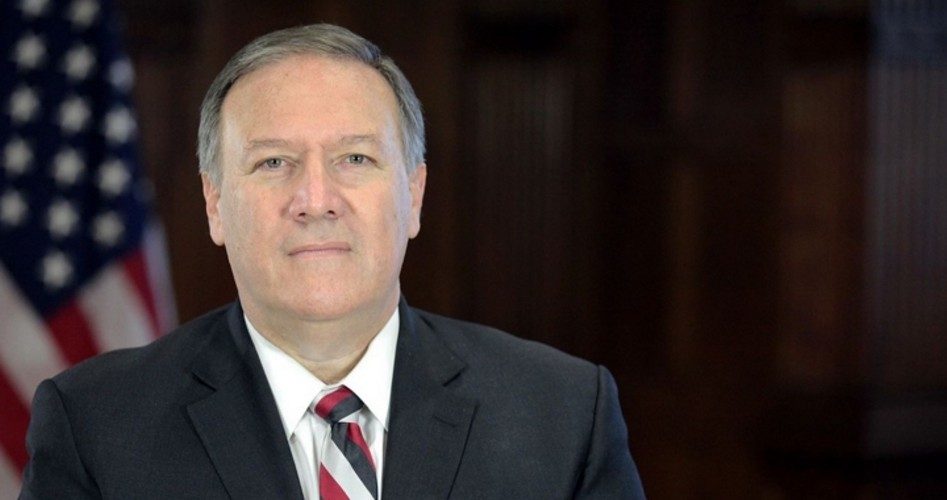
Several unnamed sources within the Trump administration have told members of the media, including reporters with Bloomberg, The Hill, and the New York Times, that President Trump is considering replacing Secretary of State Tillerson with CIA Director Mike Pompeo (shown).
On December 1, Tillerson dismissed reports that the president is seeking to remove him from his position. “It’s laughable. It’s laughable,” Tillerson told reporters when asked about the statements attributed to senior U.S. officials the previous day.
The Times reported on December 1 that Trump has not yet agreed to the plan to replace Tillerson that was developed by John F. Kelly, the White House chief of staff, the unnamed officials said. However, noted the report, the president is said to have become disenchanted with Tillerson and is ready to make a change at State. The Times reported that Trump spoke harshly about Tillerson in front of White House aides as recently as November 30, according to one person close to the president, but did not seem quite ready to replace the secretary.
The Times report noted that Trump and Tillerson have been at odds over a number of major issues, including the Iran nuclear deal, the tense relationship with North Korea over that country’s missile program and nuclear test, and disputes between Arab allies.
A December 1 Bloomberg report observed that relations between White House staff and Tillerson’s key staffers have been broken since the summer, when the two sides all but stopped talking, according to one of the officials, all of whom asked not to be identified discussing internal matters.
However, Tillerson is still functioning in his position normally and Tillerson is scheduled to have lunch Friday at the White House with Trump and Secretary of Defense James Mattis before Mattis begins his scheduled visit to the Middle East.
Bloomberg cited State Department spokeswoman Heather Nauert, who said Tillerson is continuing with a “robust” agenda and offered the secretary’s upcoming European trip as an example. (Tillerson will travel to Brussels for a meeting of NATO foreign ministers and then to Vienna for a meeting of the Organization for Security and Cooperation in Europe.) Nauert also said that White House Chief of Staff John Kelly called Margaret Peterlin, Tillerson’s chief of staff, on November 30 to reassure her that reports of Tillerson being ousted are not true. But Nauert also emphasized that Tillerson, like all administration appointees, “serves at the pleasure of the president.”
Those predicting that Tillerson will soon be relieved of his responsibilities at State most often name Pompeo as his most likely replacement. A former three-term member of the House, he has impressed Trump during daily intelligence briefings and become a trusted policy adviser on issues far beyond the CIA’s mandate, such as health care, observed the Times. Those suggesting that Pompeo will take over at State have named Senator Tom Cotton (R-Ark.) as a likely successor for Pompeo’s spot to head the CIA. Cotton is regarded as a key ally of the president on national security matters. The Times report observed that Pompeo would be would be more hawkish than Tillerson on Iran, North Korea, and other key foreign policy issues.
A report in The Hill concurred with that observation, stating:
Putting Pompeo atop the State Department would make one of the more hawkish figures in the Trump administration the nation’s chief diplomat, responsible for stewarding U.S. foreign policy at a time of roiling global tensions, particularly with North Korea.
The writer of the article in The Hill noted that Pompeo “is known to be a stern critic of Iran and opposed the nuclear deal that was brokered with the country during the Obama administration.”
The report cited an op-ed piece that Pompeo wrote in July 2016, in which he stated that the Joint Comprehensive Plan of Action (JCPOA) — the international agreement on Iran’s nuclear program reached in Vienna in 2015 between Iran, the P5+1 nations, and the EU — “virtually guaranteed that Iran will have the freedom to build an arsenal of nuclear weapons at the end of the commitment.” Following Trump’s election, Pompeo said that he looked forward to rolling back the “disastrous deal.”
Trump moved to decertify the nuclear deal in October, leaving it up to Congress whether to restore sanctions on Iran.
Pompeo has also spoken more forcefully on North Korea than Tillerson, whom Trump reined in when he stressed the need for a diplomatic resolution to stem Pyongyang’s nuclear ambitions.
“I told Rex Tillerson, our wonderful Secretary of State, that he is wasting his time trying to negotiate with Little Rocket Man,” Trump tweeted in October. “Save your energy Rex, we’ll do what has to be done!”
A report in The New American in November 2016, after Trump nominated him to head the CIA, noted that “in many ways, Pompeo is a strongly conservative Republican,” but “in the areas over which his CIA directorship will be more relevant, Pompeo cannot be classified as a defender of various constitutional safeguards of civil liberties.”
On area of criticism noted in that article is especially relevant to Pompeo’s anticipated role at the head of the State Department:
In May [2016] he voted against an effort to repeal the 2001 Authorization for Use of Military Force (AUMF), which had authorized President George W. Bush to invade Iraq. The results of this open-ended military force authorization illustrates a reason to oppose mere congressional authorizations, rather war declarations. Congress chose to leave it up to the president whether to use military force in Iraq, instead of a more specific declaration of war. This unconstitutional delegation to the president of the congressional power to declare war is why the AUMFis still in effect, 15 years later.hy the AUMF. (Italics in original.)
For the constitutionalist hoping that the unlimited war powers ceded to former presidents might be withdrawn under Trump, the prospect of having a supporter of the AUMF heading the State Department is not a promising situation. It portends yet more unbridled interventionism.
Photo of Mike Pompeo: Office of the president-elect
Related article:



